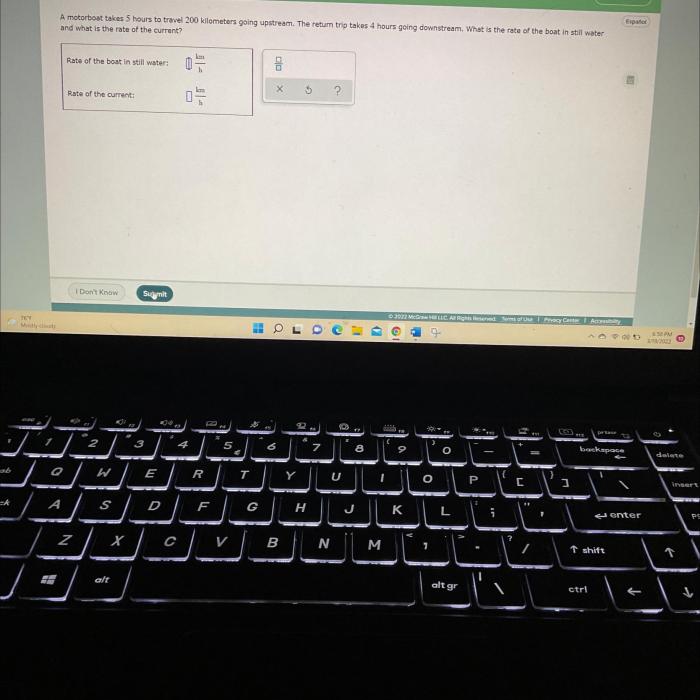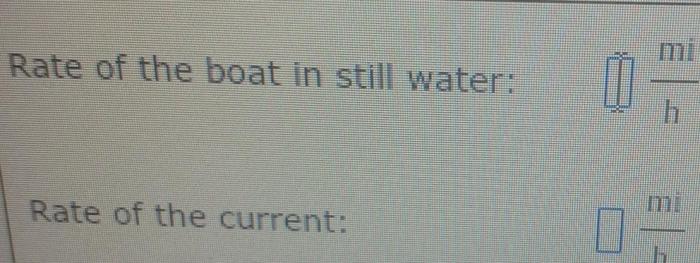A motorboat’s voyage through the waters presents a fascinating study of speed, fuel consumption, safety considerations, and navigation strategies. Embarking on a motorboat takes 5 hours to travel, we delve into the intricate relationship between these factors, uncovering insights that enhance both the enjoyment and safety of our aquatic adventures.
Understanding the dynamics of speed, distance, and time forms the cornerstone of our exploration. We examine how external factors such as wind, current, and load influence a motorboat’s speed, drawing upon real-world examples to illustrate their impact. Furthermore, we investigate the relationship between speed and fuel efficiency, exploring strategies to optimize fuel consumption while maintaining desired speeds.
Speed and Distance
Speed is a measure of how fast an object is moving. It is calculated by dividing the distance traveled by the time taken to travel that distance. The formula for speed is:
v = d/t
where:
- v is speed in meters per second (m/s)
- d is distance in meters (m)
- t is time in seconds (s)
For example, if a motorboat travels 100 meters in 10 seconds, its speed is 10 m/s.
Speed, distance, and time are related by the following equation:
d = v*t
This equation can be used to calculate any of the three variables if the other two are known.
Factors Affecting Speed
The speed of a motorboat can be affected by a number of factors, including:
- Wind: A headwind can slow down a motorboat, while a tailwind can speed it up.
- Current: A current can also affect the speed of a motorboat, depending on its direction and strength.
- Load: A heavier load can slow down a motorboat.
For example, if a motorboat is traveling against a strong headwind, its speed will be slower than if it were traveling with the wind. Similarly, if a motorboat is traveling with a strong current, its speed will be faster than if it were traveling against the current.
Fuel Consumption: A Motorboat Takes 5 Hours To Travel
The speed of a motorboat can also affect its fuel consumption. In general, the faster a motorboat travels, the more fuel it will consume.
There are a number of factors that can affect the fuel consumption of a motorboat, including:
- Engine size: A larger engine will consume more fuel than a smaller engine.
- Hull design: A hull that is designed for speed will consume more fuel than a hull that is designed for efficiency.
- Load: A heavier load will consume more fuel than a lighter load.
For example, if a motorboat is traveling at a high speed, it will consume more fuel than if it were traveling at a lower speed. Similarly, if a motorboat is carrying a heavy load, it will consume more fuel than if it were carrying a lighter load.
Safety Considerations

It is important to be aware of the safety considerations related to motorboat speed. Excessive speed can increase the risk of accidents, injuries, and even death.
Some of the safety considerations related to motorboat speed include:
- Visibility: Excessive speed can reduce visibility, making it more difficult to see obstacles and other boats.
- Control: Excessive speed can make it more difficult to control a motorboat, especially in turns.
- Stopping distance: Excessive speed increases the stopping distance of a motorboat, making it more difficult to avoid collisions.
It is important to always operate a motorboat at a safe speed, and to be aware of the conditions and surroundings.
Navigation and Planning

Navigation and planning are important considerations when operating a motorboat. Speed can affect navigation and planning in a number of ways.
For example, if a motorboat is traveling at a high speed, it will cover more distance in a shorter period of time. This can be an advantage if the motorboat is trying to reach a destination quickly. However, it can also be a disadvantage if the motorboat is trying to navigate in a狭いarea or if there are obstacles in the water.
It is important to plan a route and to be aware of the conditions and surroundings before operating a motorboat. This will help to ensure a safe and efficient trip.
Essential FAQs
What factors can affect the speed of a motorboat?
Wind, current, load, and hull design are among the key factors that influence a motorboat’s speed.
How does speed affect fuel consumption?
Generally, higher speeds lead to increased fuel consumption due to increased engine power requirements.
What are the safety considerations related to motorboat speed?
Excessive speed can reduce maneuverability, increase stopping distance, and pose risks of collision or capsizing.